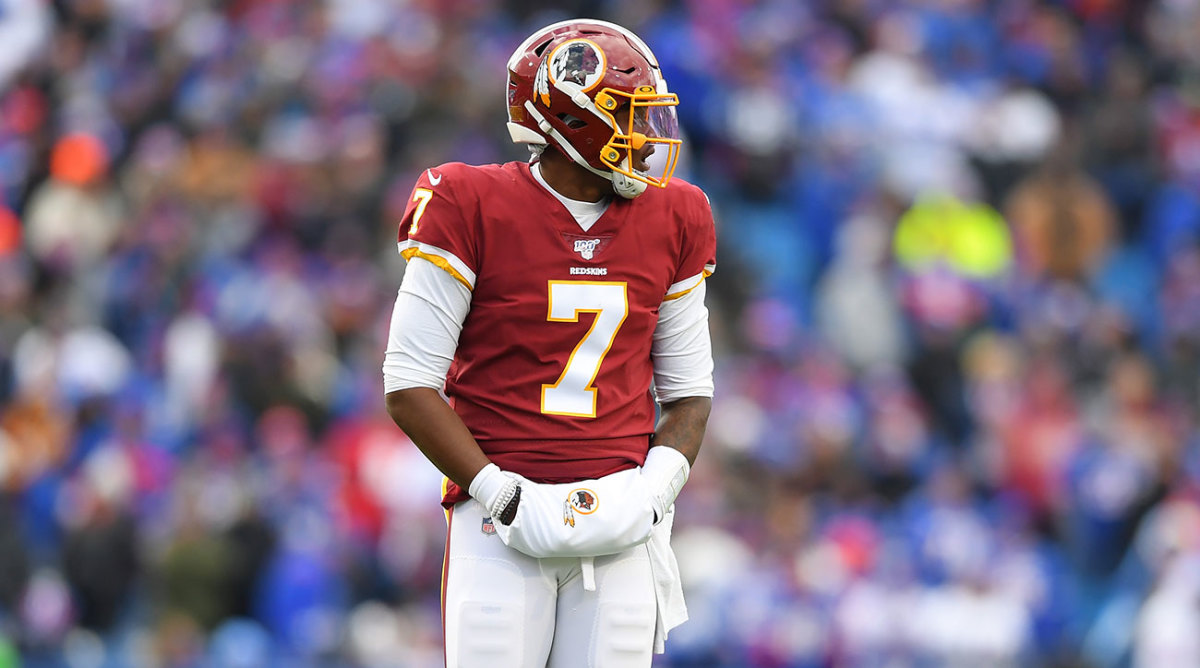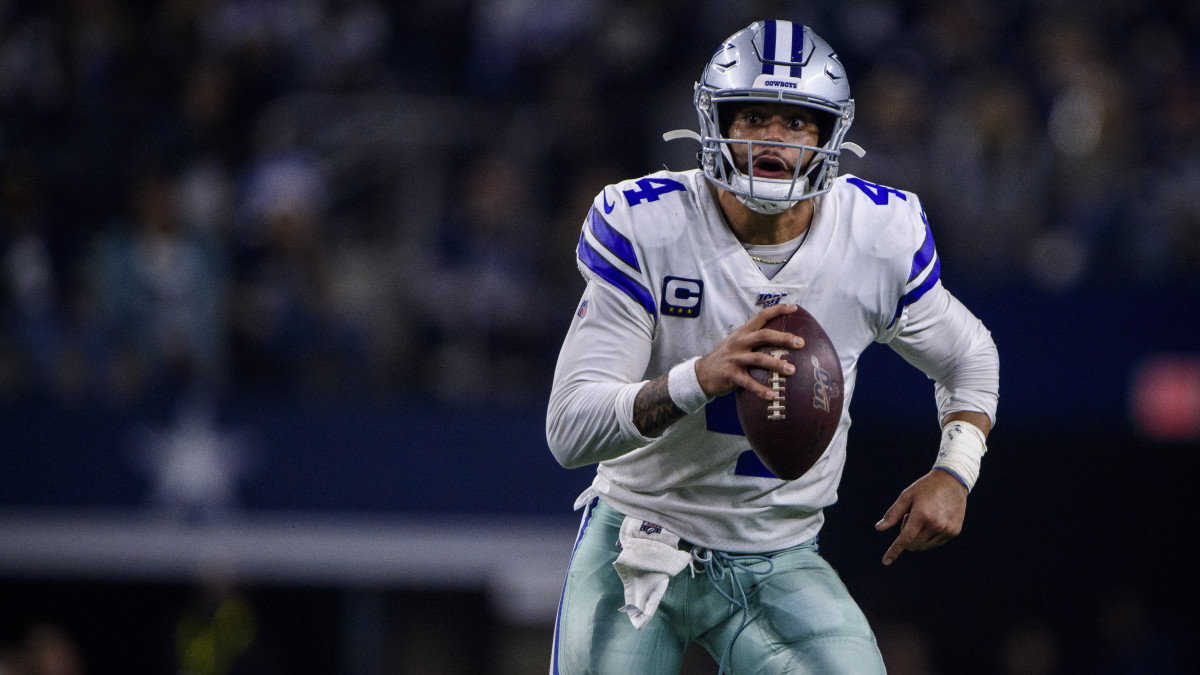Business of Football Mailbag: Players Opting Out, Washington's Name, Dak Prescott's Tender and More
As uncertainty reigns in so much of our world, the NFL has been acting with a “business as usual” strategy for months. That approach now faces a pivotal moment. Against that backdrop, here is my insight and perspective on the most frequent questions that I am receiving through emails, messages and Twitter, and in response to my podcast and these columns. I already wrote separately about Patrick Mahomes giving up a lot in his new contract extension, but there are plenty of other topics to hit.
You’ve been sounding alarms about the NFL actually playing this season. Pessimistic or realistic?
This is reality. Unlike us, the virus doesn’t care about the NFL.
My last column discussed how we need to be realistic—and adult—about the fact that playing football, or any contact sport for that matter, does not make sense if the goal is optimal health in this virus-laden environment. But, of course, the business of football has been driving the bus and we need to be realistic and aware of that.
We hear and parrot Dr. Anthony Fauci’s statement that, “The virus sets the timeline,” but so few of us fully heed that mantra. Dr. Fauci also advised Major League Baseball to finish their season by October, right when the NFL season gets going.
Yes, I’m worried. While most young and healthy people do not have adverse outcomes, there is no guarantee of that; the virus’s swift contagion is challenging. There exists the real possibility of multiple players on one team being infected, perhaps even within the same position group, and subsequently needing to quarantine. I am wondering how the NFL, or any sports league, can stage games while maintaining a high level of competitive balance.
Multiple team infections have already happened in leagues starting play soon. I know these leagues are starting, but I am not sure that they’ll all finish. The question for the NFL is this: Were one of these leagues to shut down in, say, August, are they really going to start playing football then?
I think, whether it has happened yet or not, top executives in the NFL—and all sports leagues—have to be asking themselves, in moments of introspection: Are we really doing this?
But the NFL and NFLPA are negotiating safety protocols for the season, right?
Things are playing out as I predicted, following the pattern with Major League Baseball and the MLBPA. First up were/are health and safety protocols, roster limits, work rules for playing, etc. These negotiations are, compared to the financial negotiations ahead, easier to complete—although muddled by some NFL players, including a famous one in Tampa, gathering for group workouts against NFLPA recommendations.
Next will come the tougher negotiations, anticipating the inevitable diminution of NFL revenues ahead. Although they won’t be as contentious as as we’ve seen in baseball, NFL owners, like their MLB brethren, will be intent on the players’ feeling some of their short-term pain.
Do you think a lot of NFL players will opt out?
If they are paid, yes. If they are not, my guess would be only a handful would. I have had players of all levels reach out to me over the last few months asking questions like, “Do we have to play?” My question back is, “Do you care about getting paid?”
My sense is opt-outs will only be allowed with pay upon presentation of a “doctor’s note” from a specialist, confirmed by the team doctor, detailing risk factors in choosing to play in this environment. Even then, teams may dispute full pay status and treat the player as having an NFI (non-football injury) with an ability to pay him anything between zero and full salary. And for that reason, in this harsh business where there are so few jobs for so many applicants, my sense is the number of opt-outs will be low.
Since the NFL is not going to have players in a “bubble” like other sports, there will necessarily be interactions with those outside the team environment, which is a clear and obvious risk for transmission. Some players may have pre-existing conditions that NFLPA doctor Thom Mayer has talked about—high BMI measurements, diabetes, sleep apnea, hypertension—and some may live with (or often see) relatives or others who may be immunocompromised. And, as noted in my last column, the virus can have lingering effects even for the young and healthy, as seen with Von Miller’s difficulties in recovery.
The challenges are large for all involved here: management, players, staff, etc. There are no easy solutions.
Will the NFL potentially cut out training camp and preseason games altogether?
Of course. The NFL’s objective is clear: Save the season, with as many fans as possible. The economic drivers are the real games, not preseason contests where teams strategize how not to play their best players.
The NFL is selling sponsorships for lower seat sections? Would they sell jersey sponsorships?
Empty seat sponsorships are an obvious target, and there will be more innovative revenue-producing initiatives in this unique season, limited only by our imaginations. And the NFLPA should want this as well, hopefully making their inevitable discussions about next year’s salary cap (and this year’s cap) less painful.
As to jersey patch sponsorships—as the NBA now allows—well, baby steps. Although the NFL has allowed sponsorships on training camp practice jerseys, there is still an old guard of ownership that, as I heard in one owners meeting years ago, doesn’t want NFL players “looking like NASCAR drivers.” Game jersey sponsorship will eventually come, but it is a few years away.

Do you think the Washington football team will really change its name?
I understand there is more momentum for change than ever before, and that this is more than advocacy groups and talking heads. I see Nike, Pepsi and, most importantly, FedEx (the team’s stadium naming rights partner) pushing for a change, but I want to hear from another group: NFL owners.
Will Washington owner Dan Snyder’s fraternity brothers push him to make a change? Will the team’s “thorough review” lead to a change or just more public relations chatter? (Haven’t they been “reviewing” this for 20 years”?) I’ll believe it when I see it.
I cannot get a Daniel Snyder story out of my head. A good friend of mine had daughters who played with Snyder’s daughters. One day my friend picked up his girls at Snyder’s house as Snyder was arriving home. My friend had not met Snyder but said, “Hey Dan, thanks for having my daughters over to play.” The response: “It’s Mr. Snyder.”
Really?
Do you think the Jets will trade Jamal Adams? Do you think they will rework his contract?
No and no. The Jets hold the cards here, as they have two more years of contract control, followed by potential franchise tags, with increased penalties for holdouts to boot. Adams isn’t going anywhere.

Why did Dak Prescott sign his franchise tag tender?
I have no idea, as Prescott gave up any leverage to cause the Jones family to emotionally react, as they have been known to do.
Perhaps Prescott and his agents, by guaranteeing his one-year, $31 million contract, are protecting their downside against any possibility, however remote, that the Cowboys look to him for relief. I do wonder if Prescott was able to wrangle favorable payment terms—up-front bonuses or lump sum payments, rather than pure salary paid out in the fall—or other perks such as a no-tag provision for 2021, which would be a major win if procured.
Thoughts on Cam Newton to New England? Can he replace Tom Brady?
Newton was a great player, but there is a reason he is now signing a minimum deal (don’t be fooled by the “up to $7.5 million” puffery) four months into free agency. Contracts are the clearest indicator of what teams think of players; the Patriots can now exit from his contract with minimal pain.
As for Brady, has anyone else noticed what a freed Tom Brady looks like? He has made more noise, been more active on social media and acted more mischievously in three months in Tampa than in 20 years in New England. Whether flouting the NFLPA suggestions about not having group workouts or having his brand of fun on social media, Brady is “out there” in a way he either never wanted to be (doubtful) or never was allowed to be (likely) in New England. This is what Tom Brady looks like after escaping from the shroud.
So many questions are still ahead in the business of football; I’ll try to get you through this very different offseason.
• Question or comment? Email us.
